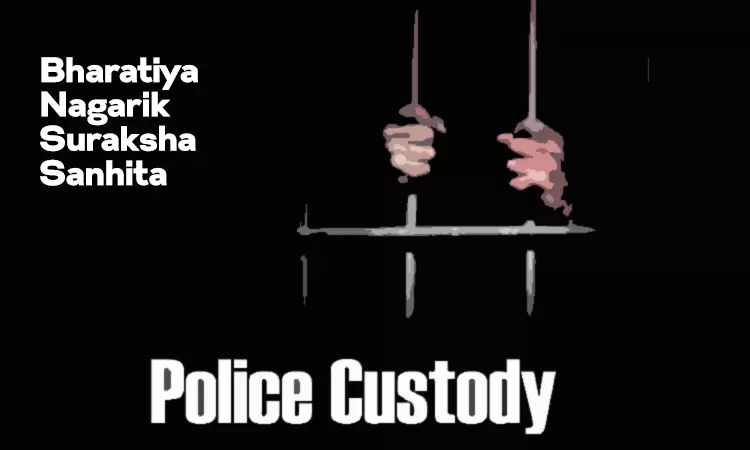
ഭാരതീയ നാഗരിക സുരക്ഷാ സംഹിതയിലെ പൊലീസ് കസ്റ്റഡി
 |
|ഇന്ത്യയില് കസ്റ്റഡി ദുരുപയോഗവും കസ്റ്റഡി മരണങ്ങളും ഇപ്പോഴും ആശങ്കയുണര്ത്തുന്ന കാര്യങ്ങളാണ്. അതിനാല്, പൊലീസ് കസ്റ്റഡി വര്ധിപ്പിക്കുന്നതിനെ സംബന്ധിച്ചുള്ള ബി.എന്.എസ്.എസ് വ്യവസ്ഥ കസ്റ്റഡി ദുരുപയോഗത്തിനുള്ള സാധ്യത വര്ധിപ്പിക്കുകയും മനുഷ്യാവകാശ ലംഘനത്തിന് കൂടുതല് അവസരങ്ങള് നല്കുകയും ചെയ്യുന്നു. ക്രിമിനല് നിയമ പരിഷ്കരണത്തിന്റെ പ്രതിഫലനങ്ങള് - ഭാഗം 02
ഭാരതീയ നാഗരിക സുരക്ഷാ സംഹിതയിലെ സെക്ഷന് 187(2), ക്രിമിനല് പ്രോസീജ്യര് കോഡിലെ സെക്ഷന് 172(2)ന്റേതിന് സമാനമായ വ്യവസ്ഥയാണ്.
ബി.എന്.എസ.്എസ് 187 (2):
The Judicial Magistrate to whom an accused person is forwarded under this section may, irrespective of whether he has or has no jurisdiction to try the case, after taking into consideration the status of the accused person as to whether he is not released on bail or his bail has not been cancelled, authorise, from time to time, the detention of the accused in such custody as such Magistrate thinks fit, for a term not exceeding fifteen days in the whole, or in parts, at any time during the initial forty days or sixty days out of detention period of sixty days or ninety days, as the case may be, as provided in sub-section (3), and if he has no jurisdiction to try the case or commit it for trial, and considers further detention unnecessary, he may order the accused to be forwarded to a Judicial Magistrate having such jurisdiction.
ക്രിമിനല് കോഡ് സെക്ഷന് 167(2):
The Magistrate to whom an accused person is forwarded under this section may, whether he has or has not jurisdiction to try the case, from time to time, authorize the detention of the accused in such custody as such Magistrate thinks fit, for a term not exceeding fifteen days in the whole; and if he has no jurisdiction to try the case or commit it for trial, and considers further detention unnecessary, he may order the accused to be forwarded to a Magistrate having such jurisdiction.
ഭാരതീയ നാഗരിക സുരക്ഷാ സംഹിതയിലെ 187(2) വകുപ്പ് പറയുന്നത്, മരണശിക്ഷ വരെ ലഭിക്കാവുന്ന കുറ്റകൃത്യങ്ങള്, ജീവപര്യന്ത തടവ് ശിക്ഷ ലഭിക്കാവുന്ന കുറ്റകൃത്യങ്ങള്, പത്ത് വര്ഷത്തില് കുറയാത്ത തടവ് ലഭിക്കാവുന്ന കുറ്റകൃത്യങ്ങള് എന്നിവയ്ക്ക് ആദ്യത്തെ 60 ദിവസങ്ങളില് മുഴുവനായോ ഭാഗങ്ങളായോ 15 ദിവസത്തെ പൊലീസ് കസ്റ്റഡി അനുവദിക്കാമെന്നും മറ്റ് കുറ്റകൃത്യങ്ങള്ക്ക് ആദ്യത്തെ 40 ദിവസങ്ങളില് ഇങ്ങനെ അനുവദിക്കാമെന്നുമാണ്. ഫലത്തില് അന്വേഷണ ഏജന്സികള്ക്ക് 15 ദിവസത്തെ പൊലീസ് കസ്റ്റഡി വിവിധ ഘട്ടങ്ങളിലായി ആവശ്യപ്പെടാം. അന്വേഷണാര്ഥം ആദ്യത്തെ 15 ദിവസങ്ങള് കഴിഞ്ഞിട്ടും 40/60 ദിവസം വരെ പൊലീസ് കസ്റ്റഡി നീട്ടി 60/90 ദിവസത്തെ മൊത്തം കസ്റ്റഡി കാലയളവ് അനുവദിക്കപ്പെടുന്നു.
കസ്റ്റഡി ദുരുപയോഗം ചെയ്യുന്നതില് നിന്നുള്ള സംരക്ഷണ വ്യവസ്ഥയായ ക്രിമിനല് പ്രോസീജ്യര് കോഡിലെ (സി.ആര്.പി.സി) സെക്ഷന് 167(2) പ്രകാരമുള്ള 15 ദിവസത്തെ പൊലീസ് കസ്റ്റഡി പരിധിയെ ഇത് ദുര്ബലപ്പെടുത്തുന്നു. അനുപം ജെ കുല്ക്കര്ണി v/s സിബിഐ (1992 SCR (3) 158) കേസില്, 15 ദിവസങ്ങള് കഴിഞ്ഞാല് - മുമ്പ് 15 ദിവസങ്ങള് പൂര്ണ്ണമായി ഉപയോഗിച്ചിട്ടില്ലെങ്കില് പോലും - കൂടുതല് പൊലീസ് കസ്റ്റഡി അനുവദിക്കില്ലെന്ന് സുപ്രീം കോടതി വിധിച്ചിരുന്നു. സി.ആര്.പി.സിയുടെ നിലവിലുള്ള വ്യാഖ്യാനമനുസരിച്ച്, ആദ്യ 15 ദിവസങ്ങള്ക്ക് ശേഷം, അറസ്റ്റിലായ വ്യക്തിയെ ആകെ 15 ദിവസത്തേക്ക് പൊലീസ് കസ്റ്റഡിയില് അയച്ചിട്ടില്ലെങ്കില്പ്പോലും പിന്നീട് പൊലീസ് കസ്റ്റഡിയില് അയക്കാന് കഴിയില്ല. അനുവദനീയമായ പൊലീസ് കസ്റ്റഡിയുടെ ദൈര്ഘ്യം വര്Oിപ്പിക്കുന്നതിലൂടെ, ചോദ്യം ചെയ്യാനുള്ള അധികാരം വര്Oിപ്പിക്കുന്നതോടൊപ്പം കസ്റ്റഡിയിലുള്ള പ്രതിയെ പീഡിപ്പിക്കുന്നതിനോ നിര്ബന്ധിക്കുന്നതിനോ എതിരെ പ്രതിക്കുള്ള സംരക്ഷണം ദുര്ബലപ്പെടുത്തുകയാണ് ബി.എന്.എസ്.എസ് ചെയ്യുന്നത്.
ഈ നിയമത്തിലെ ഏറ്റവും ഉത്കണ്ഠാവഹമായ മാറ്റമാണിത്. ഇന്ത്യയില് കസ്റ്റഡി ദുരുപയോഗവും കസ്റ്റഡി മരണങ്ങളും ഇപ്പോഴും ആശങ്കയുണര്ത്തുന്ന കാര്യങ്ങളാണ്. അതിനാല്, പൊലീസ് കസ്റ്റഡി വര്Oിപ്പിക്കുന്നതിനെ സംബന്ധിച്ചുള്ള ബി.എന്.എസ്.എസ് വ്യവസ്ഥ കസ്റ്റഡി ദുരുപയോഗത്തിനുള്ള സാധ്യത വര്ധിപ്പിക്കുകയും മനുഷ്യാവകാശ ലംഘനത്തിന് കൂടുതല് അവസരങ്ങള് നല്കുകയും ചെയ്യുന്നു.
പ്രാഥമിക അന്വേഷണം
BNSS സെക്ഷന് 173 ഉം പ്രാഥമിക അന്വേഷണവും ക്രിമിനല് പ്രോസീജ്യര് കോഡിലെ സെക്ഷന് 154, തങ്ങള്ക്ക് അറിവ് ലഭിച്ച കുറ്റകൃത്യങ്ങളില് വിവര രേഖപ്പെടുത്തലിനെക്കുറിച്ച് പറയുന്നു.
1) Every information relating to the commission of a cognizable offence, if given orally to an officer in charge of a police station, shall be reduced to writing by him or under his direction, and be read Over to the informant; and every such information, whether given in writing or reduced to writing as aforesaid, shall be signed by the person giving it, and the substance thereof shall be entered in a book to be kept by such officer in such form as the State Government may prescribe in this behalf
ക്രിമിനല് നടപടിക്രമ നിയമത്തിലെ സെക്ഷന് 154(1) പ്രകാരം അറിവ് ലഭിച്ച ഒരു കുറ്റകൃത്യത്തെക്കുറിച്ച് പരാതി നല്കാന് ഒരാള് പൊലീസ് സ്റ്റേഷനില് എത്തിയാലുടന് തന്നെ എഫ്.ഐ.ആര്. രജിസ്റ്റര് ചെയ്യല് പൊലീസ് ഉദ്യോഗസ്ഥന്റെ ബാധ്യതയാണ്. ഉദ്യോഗസ്ഥന് എഫ്.ഐ.ആര് രജിസ്റ്റര് ചെയ്യാതിരുന്നാല്, ഇന്ത്യന് ശിക്ഷാ നിയമത്തിലെ സെക്ഷന് 166 എ പ്രകാരം പൊലീസ് ഉദ്യോഗസ്ഥനെതിരെ നടപടിയെടുക്കാവുന്നതാണ്. ഇന്ത്യന് ശിക്ഷാ നിയമത്തിലെ സെക്ഷന് 166 എ-യുടെ (സി) ഉപവകുപ്പില് നല്കിയിരിക്കുന്ന കുറ്റകൃത്യങ്ങളുടെ പട്ടികയില് ആ കുറ്റകൃത്യം ഉള്പ്പെടുന്നില്ലെങ്കില് പൊലീസ് ഉദ്യോഗസ്ഥനെതിരെ അച്ചടക്ക നടപടികള് സ്വീകരിക്കാം. (State Of Haryana And Ors v. Ch. Bhajan Lal And Ors, 1992 AIR 604). ലളിത കുമാരി വേഴ്സസ് ഉത്തര്പ്രദേശ് സര്ക്കാര് കേസിലെ സുപ്രീം കോടതിയുടെ മുന് വിധിന്യായത്തില് (AIR 2012 SC 1515) കുറ്റകൃത്യം നടന്നതായി അറിവ് ലഭിച്ചാല് കിമിനല് നടപടിക്രമ നിയമത്തിലെ സെക്ഷന് 154 പ്രകാരം പ്രഥമ വിവര റിപ്പോര്ട്ട് (എഫ്.ഐ.ആര്.) രജിസ്റ്റര് ചെയ്യുന്നത് നിര്ബന്ധമാണെന്നും അത്തരമൊരു സാഹചര്യത്തില് പ്രാഥമിക അന്വേഷണത്തിന് അനുമതിയില്ലെന്നും ഭരണഘടനാ ബെഞ്ച് വിധിച്ചിട്ടുണ്ട്. ലഭിച്ച വിവരങ്ങള് കുറ്റകൃത്യം വ്യക്തമാക്കുന്നതല്ലെങ്കിലോ അന്വേഷണത്തിന്റെ ആവശ്യകത സൂചിപ്പിക്കുന്നുവെങ്കിലോ മാത്രം കുറ്റകൃത്യം നടന്നിട്ടുണ്ടോ ഇല്ലയോ എന്ന് കണ്ടെത്തുന്നതിന് മാത്രമായി ഒരു പ്രാഥമിക അന്വേഷണം നടത്താവുന്നതാണ്.
ബി.എന്.എസ്.എസ്് സെക്ഷന് 173 (3) (i) (ii)- Information in cognizable offence
173(3) Without prejudice to the provisions contained in section 175, on receipt of information relating to the commission of any cognizable offence, which is made punishable for three years or more but less than seven years, the officer in-charge of the police station may with the prior permission from an officer not below the rank of Deputy Superintendent of Police, considering the nature and gravity of the offence.
(i) proceed to conduct preliminary enquiry to ascertain whether there exists a prima facie case for proceeding in the matter within a period of fourteen days; or
(ii) proceed with investigation when there exists a prima facie case.
ബി.എന്.എസ്.എസ് സെക്ഷന് 173 പ്രകാരം, എഫ്.ഐ.ആര് രജിസ്റ്റര് ചെയ്യുന്നതിന് മുമ്പ് പ്രഥമദൃഷ്ട്യാ കേസ് സ്ഥിരീകരിക്കുന്നതിനായി പ്രാഥമിക അന്വേഷണം നടത്താന് അനുമതി നല്കുന്നു. യഥാര്ഥ പരാതികള് രജിസ്റ്റര് ചെയ്യാതിരിക്കാനായി പൊലീസ് ഈ പ്രാഥമിക അന്വേഷണത്തെ ദുരുപയോഗം ചെയ്യാന് സാധ്യതയുണ്ട്. ബി.എന്.എസ്.എസ് സുപ്രീം കോടതിയുടെ നിര്ബന്ധിത നിര്ദേശങ്ങളെ റദ്ദാക്കുകയും എഫ്.ഐ.ആര് രജിസ്റ്റര് ചെയ്യാതിരിക്കാനുള്ള സാധ്യത സൃഷ്ടിക്കുകയും ചെയ്യുന്നു. പ്രഥമദൃഷ്ട്യാ കുറ്റക്യത്യം നടന്നിട്ടുണ്ടോ എന്ന അന്വേഷണത്തിന്റെ കാരണം പറഞ്ഞ് പൊലീസിന് പരാതികളോ വിവരങ്ങളോ രജിസ്റ്റര് ചെയ്യാതിരിക്കാനോ വൈകിപ്പിക്കാനോ സാധിക്കും.
കുറ്റകൃത്യം ചെയ്തതായി ആരോപിക്കപ്പെടുകയും പക്ഷേ വിചാരണയ്ക്ക് ഹാജരാകാതെ ഒളിവില് പോകുകയും ചെയ്ത വ്യക്തികളുടെ (Proclaimed Offender) അസാന്നിധ്യത്തിലുള്ള വിചാരണ 'ഓഡി ആള്ട്ടേരം പാര്ട്ടം' (Audi Alteram Partem) എന്ന തത്വം സ്വാഭാവിക നീതിയുടെ അടിസ്ഥാന തത്വമാണ്. ആരെയും കേള്ക്കാതെ കുറ്റം വിധിക്കരുത് എന്നാണ് ഈ തത്വം പറയുന്നത്. ഇത് ഇരു കക്ഷികള്ക്കും ന്യായമായ വിചാരണയും നീതിയും ഉറപ്പാക്കുന്നു. ഈ തത്വപ്രകാരം, ഇരു കക്ഷികള്ക്കും സംസാരിക്കാനും, തങ്ങളുടെ കേസ് അവതരിപ്പിക്കാനും, എതിര്കക്ഷിയുടെ വാദങ്ങള് ഖണ്ഡിക്കാനും അവകാശമുണ്ട്.
ബി.എന്.എസ്.എസ് സെക്ഷന് 356 (1) ല് പറയുന്നു:
'when a person declared as a proclaimed offender, whether or not charged jointly, has absconded to evade trial and there is no immediate prospect of arresting him, it shall be deemed to operate as a waiver of the right of such person to be present and tried in person, and the court shall, after recording reasons in writing, in the interest of justice, proceed with the trial in the like manner and with like effect as if he was present, under this sanhita and pronounce the judgement.'
സി.ആര്.പി.സി സെക്ഷന് 299 ല് പറയുന്നത്:
'if it is proved that an accused person has absconded, and that there is no immediate prospect of arresting him, the Court competent to try or commit for trial such person for the offence complained of, may, in his absence, examine the witnesses (if any) produced on behalf of the prosecution, and record their depositions and any such deposition may, on the arrest of such person, be given in evidence against him on the inquiry into or trial for, the offence with which he is charged, if the deponent is dead or incapable of giving evidence or cannot be found or his presence cannot be procured without an amount of delay, expense or inconvenience which, under the circumstances of the case, would be unreasonable'
ക്രിമിനല് നടപടിക്രമ നിയമത്തില് (CRPC) പ്രതി ഒളിവിലായ കേസുകളില് സാക്ഷി മൊഴികള് രേഖപ്പെടുത്താനുള്ള വ്യവസ്ഥകള് നല്കുന്നു. പ്രതിയെ പിന്നീട് പിടികൂടുകയും സാക്ഷി മരിച്ചവരോ മൊഴി നല്കാന് കഴിയാത്തവനോ ആണെങ്കില് മാത്രമേ അത്തരം മൊഴികള് കോടതി സ്വീകരിക്കുകയുള്ളൂ.
ബി.എന്.എസ്.എസ് സെക്ഷന് 356 ല് പറയുന്നത്: അയാളെ ഉടന് തന്നെ പിടികൂടാനുള്ള സാധ്യതയില്ല എങ്കില് 'that there is no immediate prospect of arresting him' എന്നതിലെ 'ഉടന്തന്നെ' എന്നതിന്റെ കാലയളവ് അവ്യക്തമാണ്.
കുറ്റാരോപിതനായ വ്യക്തിയെ കേള്ക്കാനുള്ള ന്യായമായ അവസരം നല്കാതെ വിചാരണ നടത്തി വിധി പറയുന്നത് ഭരണഘടനയുടെ അടിസ്ഥാന തത്വമായ സ്വാഭാവിക നീതിയുടെ വ്യക്തമായ ലംഘനമാണ്. തെളിവുകള് സ്ഥാപിക്കാനുള്ള ഏറ്റവും പ്രധാനപ്പെട്ട രീതിയായാണ് വിചാരണയില് ക്രോസ് വിസ്താരത്തെ കണക്കാക്കുന്നത്. ഈ അവകാശം പ്രതിക്ക് നിഷേധിക്കുന്നത് ആര്ട്ടിക്കിള് 21-ാം വകുപ്പില് ഉള്പ്പെട്ടിരിക്കുന്ന നീതിപൂര്വകമായ വിചാരണയ്ക്കുള്ള അവകാശത്തിന്റെ ലംഘനവുമാണ്.
ആള്ക്കൂട്ടത്തെ പിരിച്ചുവിടാന് സായുധ സേനയെ ഉപയോഗിക്കാനുള്ള അധികാരത്തില് വരുത്തിയ മാറ്റം
CRPC യുടെ 130(1) വകുപ്പിന് തുല്യമായ BNSS-ന്റെ 149(1) വകുപ്പില് ആള്ക്കൂട്ടം പിരിച്ചുവിടാന് സായുധ സേനയെ വിന്യസിക്കുന്നത് 'ലഭ്യമായ ഏറ്റവും ഉയര്ന്ന പദവിയിലുള്ള എക്സിക്യൂട്ടീവ് മജിസ്ട്രേറ്റിന്റെ' അനുവാദം ആവശ്യമാണെന്നതിനെ 'ജില്ലാ മജിസ്ട്രേറ്റോ അദ്ദേഹം അധികാരപ്പെടുത്തിയ ഏതെങ്കിലും എക്സിക്യൂട്ടീവ് മജിസ്ട്രേറ്റോ' എന്നാക്കിയിരിക്കുന്നു.
CRPC Section 130 : (1) If any such assembly cannot be otherwise dispersed, and if it is necessary for the public security that it should be dispersed, the Executive Magistrate of the highest rank who is present may cause it to be dispersed by the armed forcse
BNSS Section 149(1): If any as_sembly referred to in sub-section (1) of section 148 cannot otherwise be dispersed, and it is necessary for the public security that it should be dispersed, the District Magistrate or any other Executive Magistrate authorised by him, who is present, may cause it to be dispersed by the armed forces
ശിക്ഷ ലഘൂകരിക്കാനുള്ള ഗവണ്മെന്റിന്റെ അധികാരം
ബി.എന്.എസ്.എസില് പരിഷ്കരിച്ച സെക്ഷന് 475 സി.ആര്.പി.സി സെക്ഷന് 433 ന്റെ ഭേദഗതിയാണ്. പുതിയ നിയമത്തിലെ ഈ വകുപ്പ് ശിക്ഷകള് കുറയ്ക്കാനുള്ള ഗവണ്മെന്റിന്റെ അധികാരം ഗണ്യമായി പരിമിതപ്പെടുത്തുന്നു. ഉദാഹരണത്തിന്, നേരത്തേ ഒരു മരണശിക്ഷ ഏത് ശിക്ഷയിലേക്കും കുറയ്ക്കാനാകുമായിരുന്നു. ഇപ്പോള് അത് ജീവപര്യന്തത്തിലേക്ക് മാത്രമേ കുറയ്ക്കാന് കഴിയൂ. ജീവപര്യന്തമോ കഠിനതടവോ ഇളവുചെയ്ത് തടവുശിക്ഷയായോ പിഴയോ ആക്കി മാറ്റാമായിരുന്നു. ഇപ്പോള്, ജീവപര്യന്ത ശിക്ഷയും കഠിന തടവും കേവലം പിഴയായി കുറയ്ക്കാന് കഴിയില്ല.
ഭാരതീയ നാഗരിക സുരക്ഷാ സംഹിത ബില്ലിലെ 475-ാം വകുപ്പ്: സര്ക്കാരിന് ശിക്ഷിക്കപ്പെട്ട വ്യക്തിയുടെ സമ്മതം കൂടാതെ ശിക്ഷ ഇളവുചെയ്യാന് അധികാരമുള്ളത്
(a) a sentence of death, for imprisonment for life;
(b) a sentence of imprisonment for life, for imprisonment for a term not less than seven years;
(c) a sentence of imprisonment for seven years or ten years, for imprisonment for a term not less than three years;
(d) a sentence of rigorous imprisonment, for simple imprisonment for any term to which that person might have been sentenced;
(e) a sentence of imprisonment up to three years, for fine
സി.ആര്.പി.സി സെക്ഷന് 433 പ്രകാരം സര്ക്കാരിന് ശിക്ഷിക്കപ്പെട്ട വ്യക്തിയുടെ സമ്മതം കൂടാതെ ശിക്ഷ ഇളവുചെയ്യാന് അധികാരമുള്ളത്:
(a) a sentence of death, for any other punishment provided by the Indian
Penal Code (45 of 1860);
(b) a sentence of imprisonment for life, for imprisonment for a term not exceed_ing fourteen years or for fine;
(c) a sentence of rigorous imprisonment, for simple imprisonment for any term
to which that person might have been sentenced, or for fine;
(d) a sentence of simple imprisonment, for fine.
എന്നിരുന്നാലും, ജീവപര്യന്തം തടവ് ഏഴ് വര്ഷമായി ചുരുക്കാനുള്ള അധികാരം ഇപ്പോഴും നിലനില്ക്കുന്നുണ്ട്.
സ്പെസിമെന് സാമ്പിള് ഹാജരാക്കാന് ഉത്തരവിടാനുള്ള മജിസ്ട്രേറ്റിന്റെ അധികാരം:
ബി.എന്.എസ്.എസ് സെക്ഷന് 349 ഇങ്ങനെ വായിക്കാം:
If a Magistrate of the first class is satisfied that, for the purposes of any investigation or proceeding under this Sanhita, it is expedient to direct any person, including an accused person, to give specimen signatures or finger impressiosn or handwriting or voice sample, he may make an order to that effect and in that case the person to whom the order relates shall be produced or shall attend at the time and place specified in such order and shall give his specimen signatures or finger impressions or handwriting or voice sample: Provided that no order shall be made under this section unless the person has at some time been arrested in connection with such investigation or proceeding:
ഏതെങ്കിലും വ്യക്തിയില് നിന്ന് ഇത്തരത്തിലുള്ള മാതൃകയോ സാമ്പിളോ ശേഖരിക്കുന്നതിനാണെങ്കില്, അയാളെ അറസ്റ്റ് ചെയ്യാതെ തന്നെ കാരണങ്ങള് കാണിച്ച് മജിസ്ട്രേറ്റിന് ഉത്തരവിടാം.
BNSSന്റെ 349-ാം വകുപ്പിന്റെ രണ്ടാമത്തെ നിബന്ധന CRPC യുടെ 311 A വകുപ്പില് നിന്ന് വ്യത്യസ്തമാണ്. CRPC- യുടെ 311 A ഇങ്ങനെയാണ്:
' If a Magistrate of the first class is satisfied that, for the purposes of any investigation or proceeding under this Code, it is expedient to direct any person, including an accused person, to give specimen signatures or handwriting, he may make an order to that effect and in that case, the person to whom the order relates shall be produced or shall attend at the time and place specified in such order and shall give his specimen signatures or handwriting.'
അന്വേഷണമോ നടപടികളോ നടക്കുന്ന ഒരു കേസില് ഏതെങ്കിലും സമയത്ത് അറസ്റ്റിലായ വ്യക്തിയല്ലെങ്കില് ഈ വകുപ്പ പ്രകാരം യാതൊരു ഉത്തരവും പുറപ്പെടുവിപ്പിക്കില്ല എന്നും സി.ആര്.പി.സിയില് വ്യവസ്ഥ ചെയ്യുന്നുണ്ട്.
ബി.എന്.എസ്.എസിലെ ഈ മാറ്റം ഒരു മജിസ്ട്രേറ്റിന് ഏതൊരു വ്യക്തിയോടും അറസ്റ്റ് ആവശ്യമില്ലാതെതന്നെ വിരലടയാളങ്ങള്, ശബ്ദ സാമ്പിളുകള് മുതലായവ നല്കാന് നിര്ദേശിക്കാന് അനുവാദം നല്കുന്നു. നേരത്തേ, സി.ആര്.പി.സിക്ക് കീഴില്, അറസ്റ്റിലായ പ്രതിയുടെ കാര്യത്തില് മാത്രമേ ഇത്തരം നടപടികള്ക്ക് ഉത്തരവിടാന് കഴിയുമായിരുന്നുള്ളൂ. അറസ്റ്റിന്റെ ആവശ്യകത തന്നെ നീക്കം ചെയ്തുകൊണ്ട് BNSS മതിയായ മേല്നോട്ടമില്ലാതെ വ്യക്തിഗത ഡാറ്റ/സാമ്പിളുകള് ശേഖരിക്കാന് പൊലീസിന് കൂടുതല് അധികാരം നല്കുന്നു. കുറ്റകൃത്യവുമായി വിശ്വാസയോഗ്യമായ ബന്ധം സ്ഥാപിക്കാതെ തന്നെ മജിസ്ട്രേറ്റിന്റെ ഉത്തരവ് പ്രകാരം ഏത് വ്യക്തിയില് നിന്നും സാമ്പിളുകള് ലഭ്യമാക്കാന് കഴിയുന്നതിനാല് ഇത് സ്വകാര്യതാ ലംഘനത്തിനും പീഢനത്തിനുമുള്ള സാധ്യത വര്ധിപ്പിക്കുന്നു.
അവലംബം: അസോസിയേഷന് ഫോര് പ്രൊട്ടക്ഷന് ഓഫ് സിവില് റൈറ്റ്സ് പ്രസിദ്ധീകരിച്ച റിപ്പോര്ട്ട്
(തുടരും)